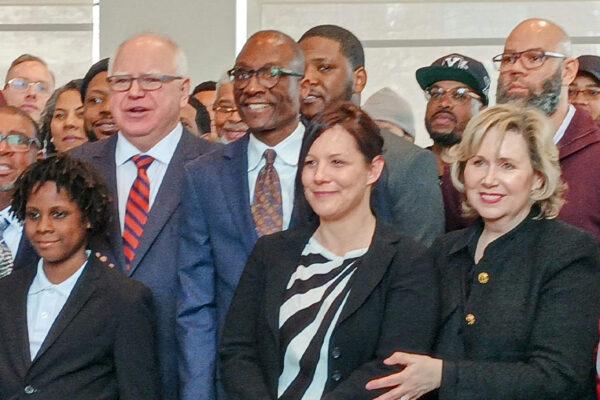Minnesota
Energy Transfer LP v. Greenpeace International, Unicorn Riot
This case in the Minnesota Supreme Court asks whether the MFFIA's protections apply to newsgatherers even if they are alleged to have engaged in trespassing while newsgathering. The ACLU’s State Supreme Court Initiative, alongside the ACLU of Minnesota and law firm Biersdorf & Associations, filed a brief representing Unicorn Riot, a media organization that covered protests of the Dakota Access Pipeline. The brief argues that MFFIA and constitutional reporter’s privileges, under both the U.S. and Minnesota constitutions, protect Unicorn Riot from having to comply with Energy Transfer’s subpoenas.
Status: Ongoing
View Case
Visit ACLU of Minnesota Stay informed about our latest work in the courts.
By completing this form, I agree to receive occasional emails per the terms of the ACLU's privacy statement.
All Cases
8 Minnesota Cases

Minnesota Supreme Court
Aug 2024
Voting Rights
Minnesota Voters Alliance v. Hunt
The ACLU and ACLU of Minnesota intervened as defendants to block an attempt by Minnesota Voters Alliance -- a private plaintiff group -- to challenge a law that restored voting rights to individuals convicted of a felony while they are "not incarcerated for the offense" and "including any period when they are on work release."
Explore case
Minnesota Supreme Court
Aug 2024

Voting Rights
Minnesota Voters Alliance v. Hunt
The ACLU and ACLU of Minnesota intervened as defendants to block an attempt by Minnesota Voters Alliance -- a private plaintiff group -- to challenge a law that restored voting rights to individuals convicted of a felony while they are "not incarcerated for the offense" and "including any period when they are on work release."

Minnesota Supreme Court
Dec 2023
Criminal Law Reform
State v Malecha
In this case, the Minnesota Supreme Court is considering the scope of a crucial doctrine that protects criminal defendants from being convicted based on evidence obtained in violation of their constitutional rights. Under both the U.S. and Minnesota Constitutions, courts apply an “exclusionary rule” that allows criminal defendants to seek the exclusion of evidence obtained in violation of their rights. For nearly 40 years, the U.S. Supreme Court has chipped away at the exclusionary rule by adopting and expanding the “good faith exception,” a doctrine providing that in some situations courts need not exclude evidence obtained in violation of the Constitution. In this case, officers acquired evidence after arresting someone based on a warrant that was listed as valid due to a recordkeeping error, but which in fact should have been recalled. In July 2023, together with other ACLU attorneys and partners, the SSCI submitted an amicus brief to the Minnesota Supreme Court asking it to hold as a matter of state constitutional law that the exclusionary rule applies to this situation, and that the good-faith exception does not apply. In March 2024, the Court ruled in the ACLU's favor, stating that the district court did not err in finding that the defendant's arrest warrant had been quashed before her arrest and the good-faith exception did not apply.
Explore case
Minnesota Supreme Court
Dec 2023

Criminal Law Reform
State v Malecha
In this case, the Minnesota Supreme Court is considering the scope of a crucial doctrine that protects criminal defendants from being convicted based on evidence obtained in violation of their constitutional rights. Under both the U.S. and Minnesota Constitutions, courts apply an “exclusionary rule” that allows criminal defendants to seek the exclusion of evidence obtained in violation of their rights. For nearly 40 years, the U.S. Supreme Court has chipped away at the exclusionary rule by adopting and expanding the “good faith exception,” a doctrine providing that in some situations courts need not exclude evidence obtained in violation of the Constitution. In this case, officers acquired evidence after arresting someone based on a warrant that was listed as valid due to a recordkeeping error, but which in fact should have been recalled. In July 2023, together with other ACLU attorneys and partners, the SSCI submitted an amicus brief to the Minnesota Supreme Court asking it to hold as a matter of state constitutional law that the exclusionary rule applies to this situation, and that the good-faith exception does not apply. In March 2024, the Court ruled in the ACLU's favor, stating that the district court did not err in finding that the defendant's arrest warrant had been quashed before her arrest and the good-faith exception did not apply.

Minnesota Supreme Court
Apr 2023
Voting Rights
Schroeder v. Minnesota Secretary of State
This case challenged the denial of the right to vote of people convicted of felonies but subject to parole, probation, or other supervised released in Minnesota.
Explore case
Minnesota Supreme Court
Apr 2023

Voting Rights
Schroeder v. Minnesota Secretary of State
This case challenged the denial of the right to vote of people convicted of felonies but subject to parole, probation, or other supervised released in Minnesota.

U.S. Supreme Court
Mar 2023
Criminal Law Reform
Tyler v. Hennepin County
This case concerns whether taking and selling a home to satisfy a debt to the government, and keeping the surplus value as a windfall, violates the Fifth Amendment's takings clause.
Explore case
U.S. Supreme Court
Mar 2023

Criminal Law Reform
Tyler v. Hennepin County
This case concerns whether taking and selling a home to satisfy a debt to the government, and keeping the surplus value as a windfall, violates the Fifth Amendment's takings clause.
